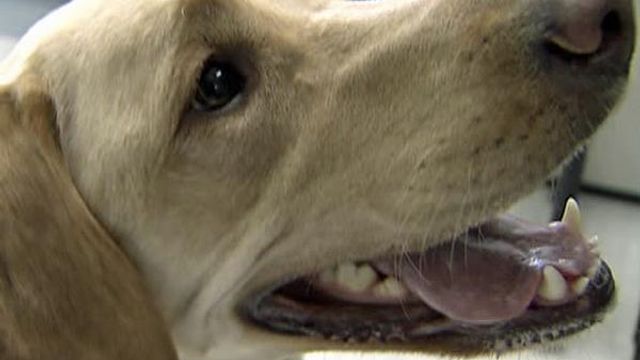Duke lab seeks to learn how dogs think
Have you ever wondered what your dog was thinking? Researchers at Duke University are trying to find out.
Posted — UpdatedDuke is the first college campus to open a Canine Cognition Center, a lab where students can interact with dogs and learn why they bond so easily with people.
Brian Hare, an assistant professor of evolutionary anthropology at Duke, started the center last fall.
“We have the cheapest tuition and best acceptance rate at Duke,” Hare said of the center. "We kind of jokingly call it the, 'Does your dog love you more than a stranger?' study.”
Hare’s research revolves around what many of us already know – dogs communicate with us.
“As an undergraduate I thought, well I play fetch with my dog and if he loses his ball, I just point and tell him where to go and he goes and gets it right.” Hare said of what first inspired him to study dog behavior.
The studies at the center, located inside Duke's biological sciences building, are trying to dig deeper into how dogs think and how they solve problems.
WRAL’s Debra Morgan recently brought her Labradors, Bailey and Harper, to the center to partake in the study.
In one test, research coordinator Kara Schroepfer played the role of a stranger. She hid a dog treat underneath a cup.
At first, Bailey only trusted Morgan. The dog went to the cup when she pointed at it.
However, as is typical with all the dogs in the study, Bailey soon began trusting Schroepfer too and went to the cup for a treat.
“The idea here is that basically dogs are very flexible and they realize, ‘Yes you're my owner, and yes I’ve interacted with you lots, and you always help me, but there are lots of other people, and they might help me to,’” Hare explained.
Schroepfer then took part in a different test with Harper to understand whether the dog understood that a pointing finger would lead her to a treat.
After a couple of times of going straight to Schroepfer's hand, where the treat used to be, Harper changed her thinking. She was able to interpret that the treat had been moved to underneath the cup based on Schroepfer’s hand gestures.
What surprises some scientists looking into canine cognition is that dogs can understand our gestures and communicate with humans better than your average primate, such as a chimpanzee.
“It ends up that because they've lived for so long with people, they do some really interesting stuff that other animals don't do,” Hare said. “Dogs are really good at understanding human communication.”
Hare said dogs are about as good at communicating with us as young children.
So far, about 650 dogs are signed up to participate in the canine cognition study. The findings could lead to better training of drug-sniffing dogs, as well as dogs that do search and rescue and guide the blind.
• Credits
Copyright 2024 by Capitol Broadcasting Company. All rights reserved. This material may not be published, broadcast, rewritten or redistributed.





